Curious about whether myrrh is safe for cats? We’ve all heard of the famous story from the Bible of how three wise men gave baby Jesus jewellery, precious stones and gold — plus, a lump of myrrh!
But does that mean that your curious kitty can benefit from this ancient resource too? Well, you may be surprised to learn that yes…myrrh could actually provide some health benefits for felines.
In this blog post we’ll take a closer look at the safety and potential risks associated with giving myrrh to cats so you feel confident in knowing what’s best for your furry friend. Read on to find out more!
What Is Myrrh?
Myrrh is a natural, resinous material derived from the Commiphora myrrha tree. It’s commonly used in traditional and medicinal practices for its aroma and healing properties, but it can also be found in certain pet products as an ingredient.
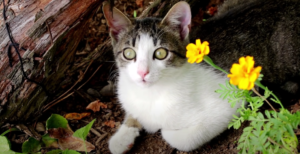
Is It Poisonous to Cats?
The good news is that myrrh is generally considered non-toxic for cats, but there are a few things to keep in mind. Since it comes from a tree, there’s the potential for allergic reactions — so it’s always best to consult with your vet before giving your cat any type of supplement or medicinal product containing myrrh.
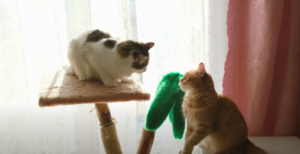
Symptoms of Poisoning
Shaking episodes
If your cat ingests a large amount of myrrh, you may start to notice some symptoms right away.
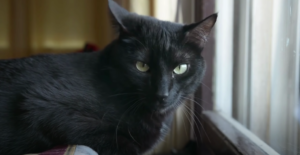
These can include shaking and trembling episodes, as well as vomiting and diarrhoea. In severe cases, the symptoms could be more serious and require immediate medical attention.
Tremors
Aside from shaking and trembling, other symptoms of myrrh poisoning in cats can include tremors, difficulty walking or standing, poor coordination, excessive salivation and seizures.
Dribbling
If your cat has consumed a large amount of myrrh and is showing symptoms, you may also notice excessive dribbling from their mouth or nose. This can be an indication that the poisoning is severe and needs to be treated immediately.
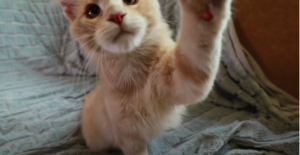
Lethargy
A cat who has ingested too much myrrh could become lethargic and display signs of depression. If your kitty is exhibiting any of these symptoms, contact your vet as soon as possible.
Depression
Depression is another common symptom that could result from myrrh poisoning. Cats may become withdrawn, refuse to eat or play, and exhibit other signs of sadness. If you notice any of these behaviours in your pet, get them to the vet right away.
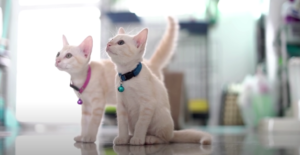
Vomiting
Vomiting is a common symptom of myrrh poisoning in cats and should be taken seriously. If your pet is vomiting, they could also be suffering from dehydration or other serious medical issues that need to be addressed right away.
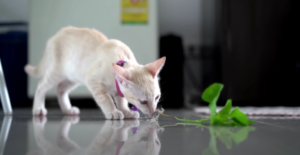
Diarrhea
Cats who have ingested too much myrrh may experience diarrhea as a side effect. Diarrhea can lead to dehydration and other serious health problems if not treated immediately, so take your cat to the vet if you notice any signs of this symptom.
The Silver Lining
Despite the potential risks associated with myrrh, it can actually provide some health benefits for cats. It’s known to have anti-inflammatory and antiseptic properties, which means it can help reduce swelling and fight off infections. Myrrh is also thought to be beneficial for a cat’s digestive system, helping to soothe an upset stomach or improve appetite.
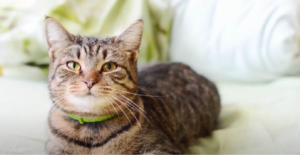
Though there are risks to consider, myrrh can be a safe and beneficial supplement for cats when given in small doses and monitored closely.
FAQ
What does myrrh do to cats?
Myrrh is thought to be beneficial for cats, providing anti-inflammatory and antiseptic properties that can help reduce swelling and fight off infections. It also may improve a cat’s digestive system and appetite.
Is myrrh safe for cats?
Yes, myrrh is generally considered non-toxic for cats, however it is important to consult with your vet before giving myrrh to your cat.
It can be dangerous if given in large doses or for long periods of time and may lead to potential side effects such as gastrointestinal distress and even kidney damage.
What are the symptoms of myrrh poisoning in cats?
Symptoms of myrrh poisoning in cats can include shaking and trembling episodes, difficulty walking or standing, poor coordination, excessive salivation and seizures, excessive dribbling from the mouth or nose, lethargy and depression. If your cat is exhibiting any of these symptoms, contact your vet immediately.
What are the benefits of myrrh for cats?
Myrrh is known to have anti-inflammatory and antiseptic properties, which means it can help reduce swelling and fight off infections. Myrrh is also thought to be beneficial for a cat’s digestive system, helping to soothe an upset stomach or improve appetite.
However, it is important to consult with your vet before giving myrrh to your cat, as it can be dangerous if given in large doses or for long periods of time.
Is myrrh toxic to pets?
Yes, myrrh can be toxic to pets if given in large doses or for long periods of time. Symptoms of myrrh poisoning in cats can include shaking and trembling episodes, difficulty walking or standing, poor coordination, excessive salivation and seizures, excessive dribbling from the mouth or nose, lethargy and depression. If your pet is exhibiting any of these symptoms, contact your vet immediately.
Is myrrh resin safe for cats?
Yes, myrrh resin is generally considered non-toxic for cats. However, it is important to consult with your vet before giving myrrh resin to your cat, as it can be dangerous if given in large doses or for long periods of time.
Symptoms of myrrh poisoning in cats can include shaking and trembling episodes, difficulty walking or standing, poor coordination, excessive salivation and seizures, excessive dribbling from the mouth or nose, lethargy and depression. If your cat is exhibiting any of these symptoms, contact your vet immediately.
Is frankincense and myrrh essential oil safe for cats?
No, frankincense and myrrh essential oils are not safe for cats. Essential oils contain concentrated amounts of volatile compounds which can be dangerous to cats as they lack certain enzymes that other animals have to break down these compounds. If your cat ingests any amount of either of these essential oils, contact the vet immediately.
Is frankincense and myrrh incense safe for cats?
Yes, frankincense and myrrh incense are generally considered safe for cats when used in small amounts. However, it is important to ensure that the incense you use does not contain any essential oils which could be dangerous to cats.
Additionally, make sure that your cat is not exposed to too much smoke or fumes from the incense as this could cause respiratory issues. If your cat is displaying any symptoms after being exposed to incense, contact the vet immediately.
Is myrrh essential oil toxic?
Yes, myrrh essential oil can be toxic if ingested or applied directly to the skin. Essential oils contain concentrated amounts of volatile compounds which can be dangerous to animals as they lack certain enzymes that other animals have to break down these compounds. If your cat ingests any amount of myrrh essential oil, contact the vet immediately.
What can I do if my cat has been exposed to myrrh?
If your cat has been exposed to myrrh, contact the vet immediately. Depending on how much was ingested or applied and when it happened, they may recommend that you induce vomiting or give activated charcoal to absorb the toxins. It is important to follow your vet’s instructions and seek medical attention as soon as possible.
Symptoms of myrrh poisoning in cats can include shaking and trembling episodes, difficulty walking or standing, poor coordination, excessive salivation and seizures, excessive dribbling from the mouth or nose, lethargy and depression. If your pet is exhibiting any of these symptoms, contact your vet immediately.
What other benefits does myrrh offer cats?
Myrrh is believed to be beneficial for cats in several ways, including reducing inflammation and fighting infections. It can also help promote digestion, relieve pain and reduce anxiety. Some pet owners have even used myrrh to treat an upset stomach or improve appetite.
However, it is important to consult with your vet before giving your cat myrrh, as it can be dangerous if given in large doses or for long periods of time. Additionally, make sure that you only use therapeutic-grade myrrh and not synthetic or fragrant versions.
What other precautions should I take?
It is important to only use therapeutic-grade myrrh with your cat and never synthetic or fragrant versions. Additionally, it is important to consult with your vet before giving your cat myrrh as it can be dangerous if given in large doses or for long periods of time.
If you do decide to give your cat myrrh, make sure that you follow the recommended dosage and never exceed it. If at any time your cat exhibits signs of discomfort or distress, contact the vet immediately for advice.
What if my cat ingests too much myrrh?
If your cat ingests too much myrrh, it is important to seek medical attention immediately. Depending on how much was ingested and when it happened, the vet may recommend that you induce vomiting or give activated charcoal to absorb the toxins. It is important to follow the vet’s instructions and seek medical attention as soon as possible.
Symptoms of myrrh poisoning in cats can include shaking and trembling episodes, difficulty walking or standing, poor coordination, excessive salivation and seizures, excessive dribbling from the mouth or nose, lethargy and depression. If your pet is exhibiting any of these symptoms contact your vet immediately.
What are the risks of using myrrh?
Myrrh is generally considered to be safe for cats when used in small amounts and following the recommended dosage. However, if too much is ingested or applied directly to the skin, it can be dangerous and cause adverse reactions such as vomiting, diarrhea, excessive salivation and seizures.
Additionally, some cats may be allergic to myrrh, so it is important to watch for signs of irritation or discomfort. If your cat exhibits any of these symptoms, contact the vet immediately. It is also important to only use therapeutic-grade myrrh and not synthetic or fragrant versions as these can be toxic when ingested.
What other essential oils are safe for cats?
In addition to myrrh, there are several other essential oils that are safe for cats. These include chamomile, lavender, sweet orange, lemon balm and rosemary. Each of these essential oils has its own set of benefits and should be used in moderation following the recommended dosage.
What should I do if I think my cat has been poisoned?
If you suspect that your cat has ingested a toxic substance, it is important to seek medical attention immediately.
Depending on the type of toxin ingested and how much was taken in, the vet may recommend inducing vomiting or administering activated charcoal to absorb the toxins. It is important to follow your vet’s instructions and seek medical attention as soon as possible.
What other methods of treatment are available for cats?
In addition to essential oils, there are many other natural remedies that can be used to treat a variety of ailments in cats. Some of these include herbs such as chamomile or ginger, homoeopathic remedies and vitamins or supplements.
Additionally, massage therapy and laser therapy have been shown to be beneficial for cats in pain. It is important to consult with a veterinarian before trying any of these methods as the wrong treatment could be dangerous or cause more harm than good.
How often should I use myrrh for my cat?
Myrrh should only be used in moderation and according to the recommended dosage. It is not recommended to use myrrh every day or for extended periods of time as it can be dangerous in high doses.
If you do decide to give your cat myrrh, watch them closely for signs of discomfort or distress and contact the vet immediately if any are observed.
Additionally, it is important to only use therapeutic-grade myrrh and not synthetic or fragrant versions as these can be toxic when ingested.
How can I ensure that my cat remains safe when using myrrh?
The best way to ensure your cat’s safety is to always use therapeutic-grade essential oils in moderation and according to the recommended dosage.
Additionally, it is important to watch your cat closely for signs of distress or discomfort after they have been exposed to myrrh and contact the vet immediately if any are observed.
Lastly, it is important to only use the essential oil for its intended purpose and not as a substitute for medical care or treatment.
How do I store myrrh when not in use?
It is important to store myrrh away from direct sunlight and heat sources. Additionally, it should be kept out of reach of children and animals in a secure container or room.
It is also important to keep track of when the oil was opened and how often it has been used as essential oils have a shelf life and may become less effective over time.
How can I tell if my cat is responding to the treatment?
To determine whether your cat is responding to the treatment, it is important to observe their behaviour and note any changes.
If you notice that your cat’s symptoms have improved or disappeared altogether, then this could be a sign that they are responding positively to the treatment.
Additionally, you may also wish to check in with your vet to ensure that the treatment is working correctly.
Why is it important to use myrrh safely?
Using essential oils like myrrh can be a great way to treat common ailments in cats. However, it is important to remember that all essential oils have the potential to be harmful or toxic if not used properly.
Therefore, it is important to follow the recommended dosage and only use therapeutic-grade oils so as to avoid any potential risks associated with using essential oils.
Additionally, it is important to watch your cat closely for signs of distress or discomfort and contact the vet immediately if any are observed.
Why is it important to talk to the vet before using myrrh?
It is essential to consult with a veterinarian before attempting any form of treatment for your cat. They will be able to provide advice on the best course of action and can help to ensure that your cat remains safe throughout the treatment process.
Additionally, they may be able to advise you on other non-essential oil treatments, such as herbal remedies or supplements, that may be better suited for your cat’s particular needs.
Why is it to use therapeutic-grade myrrh?
Therapeutic graderrh is essential when attempting any form of treatment with essential oils. This is because synthetic or fragrant versions of the oil may contain impurities that can be toxic when ingested by animals.
Therefore, it is important to always use therapeutic grade myrrh and adhere to the recommended dosage in order to avoid any potential risks associated with using essential oils.
Are there any other tips for using myrrh safely?
Yes, there are a few additional tips that can help to ensure your cat’s safety when using myrrh:
- Only use therapeutic-grade oils and not synthetic or fragrant versions.
- Follow the recommended dosage and do not exceed this amount.
- Store myrrh away from direct sunlight and heat sources in a secure container or room.
- Keep track of when the oil was opened and how often it has been used, as essential oils have a shelf life.
- Monitor your cat’s behaviour closely and contact the vet immediately if any signs of distress or discomfort are observed.
- Do not use myrrh as a substitute for medical care or treatment.
Why is it important to talk to the vet before using myrrh?
It is essential to consult with a veterinarian before attempting any treatment for your cat. This is because they will be able to provide advice on the best course of action and can help ensure that your cat remains safe throughout the process.
Additionally, they may be able to advise you on other non-essential oil treatments, such as herbal remedies or supplements, that may be better suited for your cat’s particular needs.
Additionally, it is important to ensure that the myrrh you are using is pure and of therapeutic grade in order to avoid any potential risks associated with using essential oils.
Does myrrh have any side effects?
Myrrh can be an effective treatment for a variety of ailments in cats. However, it is important to remember that all essential oils have the potential to be harmful or toxic if not used properly.
Therefore, it is important to follow the recommended dosage and only use therapeutic-grade oils so as to avoid any potential risks associated with using essential oils. Additionally, it is important to watch your cat closely for signs of distress or discomfort and contact the vet immediately if any are observed.
Do cats react differently to myrrh?
Every cat is unique and can react differently when exposed to essential oils. It is important to keep in mind that cats are more sensitive than humans when it comes to essential oils, so it is always best to start with a small dose of the oil and gradually increase as needed.
Additionally, reactions such as rashes, sneezing, coughing and vomiting should be monitored closely and the vet contacted immediately if any are observed.
Does myrrh have any other uses?
Myrrh has many other potential uses besides being a treatment for cats. It has long been in aromatherapy and as additive to perfumes, cosmetics, and incense.
Additionally, it can also be applied topically for its anti-inflammatory properties or as an antiseptic for wound healing. However, it is important to remember that myrrh should always be used with caution and care when used on animals or humans alike.
Do cats need to be monitored while using myrrh?
Yes, it is important to monitor your cat closely while they are using myrrh. This is because essential oils can be toxic when ingested, and it is important to ensure that the recommended dosage is not exceeded.
Additionally, any signs of distress or discomfort should be observed and the vet contacted immediately if any are observed.
It is also important to remember that cats are more sensitive than humans when it comes to essential oils, so it is best to use caution and start with a small dose of the oil before gradually increasing as needed.
Does myrrh have any other benefits?
Myrrh is known for its antimicrobial, antifungal and anti-inflammatory properties. In cats, it can be used to reduce inflammation associated with allergies or wounds, as well as to help support the immune system.
Additionally, it has been used throughout history to help treat respiratory illness in cats, as well as a natural remedy for digestive issues. Myrrh is also known to be calming and can help reduce anxiety in cats.
Does myrrh need to be diluted before use?
Yes, it is important to always dilute essential oils with a carrier oil before using on cats, as they are sensitive to these compounds. Additionally, this will also help ensure that the recommended dosage is not exceeded.
Common carrier oils such as almond, coconut or jojoba oil can be used to dilute myrrh when used on cats. It is important to remember that the correct ratio of carrier oil to essential oil should be used in order for the treatment to be safe and effective for your cat.
Does myrrh have any interaction with other medications?
It is possible that there may be an interaction between myrrh and certain medications, so it is important to speak to your vet before administering this essential oil.
Additionally, it is also important to make sure that the recommended dosage is not exceeded as this could lead to detrimental side effects in cats.
Do cats need to be tested before using myrrh?
It is important to consult your vet before administering any essential oils or other treatments to your cat. This will help ensure that the treatment, such as myrrh, is safe and effective for your pet.
Additionally, your vet may want to conduct tests in order to assess the overall health of your cat before starting any treatment.
Does myrrh have any side effects?
Yes, there can be certain side effects associated with using myrrh on cats. These may include rashes, sneezing, coughing and vomiting.
If you notice any of these signs or if your cat begins to show signs of distress while using the essential oil, it is important to stop the treatment immediately and contact your vet.
Do cats need to be supervised while using myrrh?
Yes, it is important to supervise your cat closely while using myrrh. This will help ensure that the recommended dosage is not exceeded, as well as ensuring that signs of distress or discomfort are noticed and addressed immediately.
Additionally, it is important to keep in mind that cats are more sensitive than humans to essential oils, so it is best to start with a small dose of the oil before gradually increasing as needed.
Can myrrh be used on other pets?
Yes, myrrh can be used for other animals, such as horses and dogs. However, it is still important to consult with a vet before administering any essential oils or treatments to your pet.
This will help ensure that the treatment is safe and effective for your pet. Additionally, it is important to remember that all animals are different, so the recommended dosage and dilution ratio may need to be adjusted accordingly.
Can I use myrrh on myself?
Yes, it is possible to use myrrh on yourself provided that the recommended dilution ratios are followed. However, it is important to remember that humans are more resilient than cats and other animals when it comes to essential oils, so it is best to start with a small dose of the oil before gradually increasing as needed.
Additionally, it is also important to make sure that the oil you are using has not expired or been contaminated in any way.
Useful Video: What is myrrh? | Natural History Museum
Conclusion
To summarise, we’ve looked at the potential effects of giving myrrh to cats, both positive and negative. From what we know, it’s possible that ingesting small amounts of this powerful herb may be beneficial to some cats, though more research is needed to determine any lasting effects.
Additionally, we must consider the downside of using myrrh too often or in large doses, as it could cause side effects such as anaemia, kidney failure or liver malfunction in cats with lowered immunity or those prone to certain illnesses. If you’re considering giving myrrh to your feline companion, do so at your own risk.
Be sure to consult with a veterinarian for professional advice before giving your cat any kind of supplements or herbal products. By doing so, you’ll ensure that your pet remains healthy and happy for years to come!
References:
https://kittydevotees.com/2022/03/03/is-myrrh-safe-for-cats/





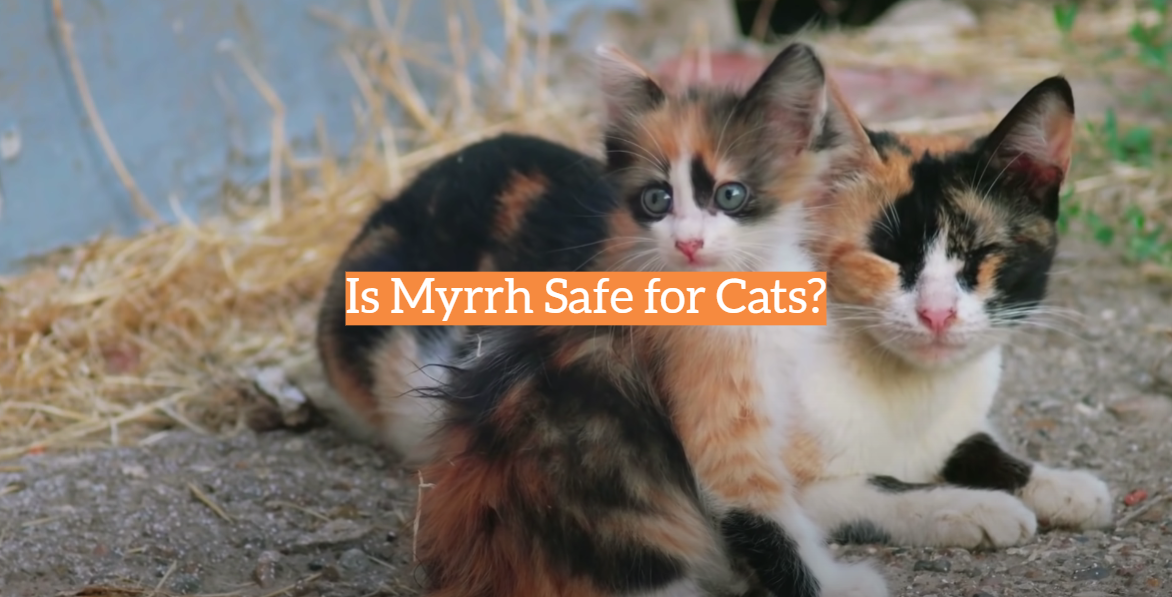




Leave a Reply